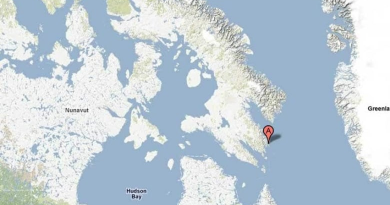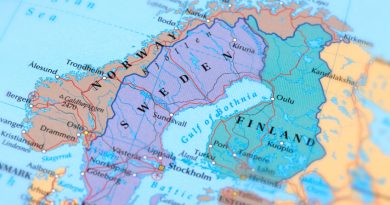Canadian icebreaker’s crew wants to find helicopter from fatal crash
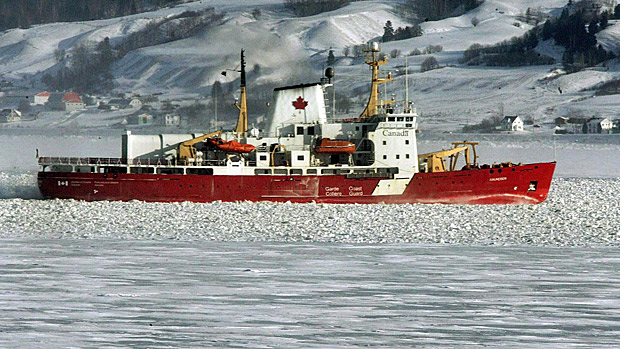
The crew of the Canadian icebreaker Amundsen want to return to the site where the ship’s helicopter plunged into Arctic waters Monday, killing three of their colleagues, in an attempt to salvage the aircraft and find out what went wrong.
Scientist Dr. Klaus Hochheim, ship captain Marc Thibault and helicopter pilot Daniel Dubé died in the crash. Their bodies were found and retrieved by the Amundsen.
Martin Fortier, the executive director of ArcticNet, which is conducting Arctic research on board the Amundsen, told CBC News, “The scientists on board, even the ones that want to continue for the science, made it clear that if there is a possibility for the ship to go salvage and find answers, that should be the priority, so that’s a feeling on board that we also need to take account in our decisions.”
The helicopter sank and cannot be seen. Fortier said the the Amundsen is uniquely suited to the task of finding the wreck, equipped, with multibeam echosounders that can scan the ocean floor and a remotely operated undersea vessel.
The bodies of the three men who died in the Northwest Passage have been moved from the icebreaker to shore in Resolute, in Canada’s eastern Arctic territory of Nunavut. Weather permitting, a flight to take them home will most likely take place Friday.
Fortier said two counsellors were flown in Wednesday to provide support to the 77 people, researchers and ship’s crew on board the Amundsen that is now docked in a bay off the coast of Resolute. He also said that anyone who wants to leave the ship following the trauma of losing close colleagues will be permitted to do so.
The crash of the Messerschmitt BO 105S helicopter occurred at 8 p.m. ET (6 p.m. MT) Monday in the M’Clure Strait, in the Arctic Ocean north of Banks Island in the Northwest Passage, about 600 kilometres west of Resolute.
The men on the helicopter were conducting a reconnaissance mission on the state of the ice in the area when the crash occurred. They had flown from the Amundsen.
Sylvain Bertrand, a new captain, arrived yesterday to take over the helm of the coast guard icebreaker
Chopper had been conducting an ice survey
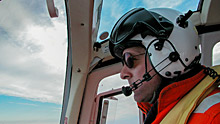
David Barber, a leading Arctic researcher, said he had collaborated with Hochheim for over 30 years, and had flown himself on the Amundsen’s helicopter days before the crash.
In an interview from his office at the University of Manitoba, he told CBC News the chopper was returning from a survey of the ice just before it crashed. “We do surveys to get measurements of the thickness of the ice, and the roughness of the surface and the roughness of the keels underneath the ice.
“They had radioed to say they would be landing on the ship in a few minutes,” he said. But then no more was heard, even when attempts were made from the ship to radio the chopper, and so the Amundsen proceeded to the last location identified by the messages. It found a debris field on the water before it came across the three bodies floating on the open sea.
The helicopter had sunk, Barber said, but the debris on the surface suggests it must have hit the water hard.
Working in the Arctic is dangerous, Barber said, explaining he’s known three other colleagues who have died in accidents in the North, including fellow Winnipegger Marty Bergmann, director of the Polar Continental Shelf Program, who was among the victims in a 2011 crash of a First Air Boeing 737 that was attempting to land at Resolute in the high Arctic.
It’s a high price, Barber said, but there’s no alternative.
“We cannot not go to the Arctic. We have to be there, we have to be on the ground, we have to conduct this research right where it happens, not looking at it remotely, not trying to use approximations from models,” he said.
Amundsen crew a tight-knit group
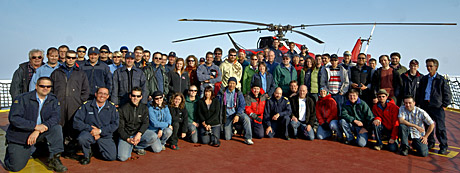
Fortier, speaking from ArcticNet’s offices at Laval University in Quebec City, told CBC his first most urgent task was to notify the families of the dead men quickly.
The crew and scientists on board the Amundsen are a tight-knit group, he said, 80 people living in a small space for over a month at a time, sharing meals and work as well. The captain, Thibault, always went on the helicopter surveys, and the pilot, Dubé, would attend science talks on the ship. Fortier described the Amundsen as a “family” that lost “three brothers.”
Fortier said weather conditions at the time of the crash consisted of “beautifully flat open water and clear skies.” He added, “That made it even worse, trying to ask ‘Why?”’
The Canadian Coast Guard, which operates the Amundsen, issued a statement Thursday saying a decision on the future of the scientific mission of the ship will be made in the next few days in collaboration with ArcticNet. The coast guard also said it will collaborate fully with the investigation of the Transportation Safety Board.
Related Link:
Coast guard helicopter crash kills 3 in Canadian, CBC News
Remembering the victims of helicopter crash in Canadian, CBC News

